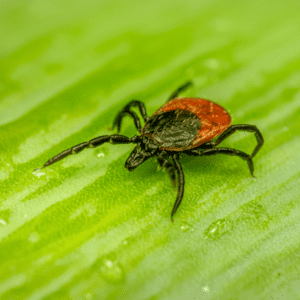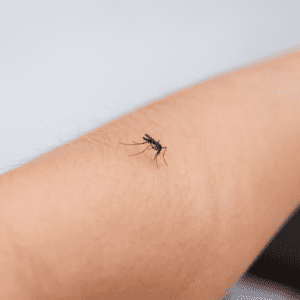Stay Healthy: Mosquito and Tick Season is Upon Us
Stay Healthy: Mosquito and Tick Season is Upon Us
Published by Chelsea Update
As the weather warms up, the Washtenaw County Health Department is reminding residents to take steps to prevent tick and mosquito bites while enjoying the outdoors.
Ticks can be active when the weather is above 40⁰F and mosquitoes are just starting to be active.
“The best way to avoid mosquito- and tick-borne illnesses is to prevent bites,” says Kristen Schweighoefer, MPH, RS, environmental health director for the Washtenaw County Health Department. “Tick season is already here. If any community member finds a tick attached to their body, they should remove it right away and monitor their health. If any symptoms like a fever, rash, or muscle or joint aches develop, contact a medical provider immediately.”
The Health Department is participating in the Vector-Borne Disease Surveillance Program again this year, in partnership with the Michigan Department of Health and Human Services (MDHHS). The Health Department will collect and identify mosquitoes and ticks to help understand local disease risk and contribute data to the statewide tracking system.
Staff are conducting “tick drags” in several locations to collect ticks for identification and Lyme disease testing. Ticks of interest include deer ticks (Ixodes scapularis, also known as the blacklegged tick), which can spread Lyme and other diseases.
Later in May, Health Department staff will set up mosquito traps throughout the county. Mosquitoes of interest include Aedes aegypti, Aedes albopictus, Culiseta melanura and Coquillettidia perturbans, which can transmit Zika and Eastern Equine Encephalitis (EEE) virus, as well as other diseases. Mosquito traps will have Health Department signage. Residents are asked to please not disturb any traps found in the community.
Local data on mosquito and tick related illnesses
Lyme disease is the most reported vector-borne disease in the United States and it does spread locally. There were 61 cases of Lyme in Washtenaw County residents in 2022 — 44 of these cases were likely exposed to the Lyme bacteria in Washtenaw County in 2022, an increase from 32 in 2021.
Lone Star ticks (Amblyomma americanum) have already been identified in Washtenaw County so far this year. Once relatively rare in Michigan, Lone Star ticks have started to be more common in the Lower Peninsula over the last decade. Lone Star ticks can transmit ehrlichiosis, tularemia, Bourbon virus, Heartland virus, and southern tick-associated rash illness (STARI) and may also be associated with alpha-gal syndrome (known as red meat allergy). Lone Star ticks do not transmit Lyme disease.
Local West Nile virus cases have been sporadic in recent years and there hasn’t been a case reported in Washtenaw since 2018. Washtenaw had a case of Jamestown Canyon virus encephalitis in 2022. Michigan experienced Eastern Equine Encephalitis (EEE) activity in 2020, 2021, and 2022 but Washtenaw did not have any cases. Three travel-related cases of Zika were identified among Washtenaw residents in 2016. No confirmed cases of Zika among county residents have been identified since then.
Additional vector-borne disease data is available on our Communicable Disease Data page. More detailed Lyme disease data is on our Lyme and Ticks page.
Preventing mosquito and tick bites
The Washtenaw County Health Department recommends the following precautions to prevent disease transmission from mosquitoes and ticks.
Mosquito bite prevention tips:
- Use insect repellent and follow label instructions. To find a repellent that’s right for you, use the Environmental Protection Agency’s insect repellent search tool.
- Wear long sleeves, shoes, and socks when outdoors.
- Repair screens to keep mosquitoes out of your home.
- Reduce mosquito breeding conditions by getting rid of standing water around your home. Once a week, empty flowerpots, barrels, and other items that can hold water.
Tick bite prevention tips:
- Check for ticks after being outside. Conduct a full-body tick check using a hand-held mirror, if necessary. Parents should check their children for ticks under the arms, in and around the ears, inside the belly button, behind the knees, between the legs, around the waist, and especially in the hair.
- Use insect repellent with 20% or more DEET or other ingredients shown to be effective against ticks, and follow label instructions.
- Wear long sleeves, shoes, and socks when outdoors.
- Avoid wooded and bushy areas with high grass and leaf litter. Walk in the center of trails.
- Bathe or shower as soon as possible after coming inside from outdoor activities.
- Examine gear and pets for ticks. Ticks can also attach to dogs and cats – do tick checks on pets regularly and talk with your veterinarian about tick prevention.
Tick identification and what to do if bitten
To remove a tick, use tweezers and grip the body firmly and pull straight out of the skin. Do not twist the tick. After removing the tick, clean the bite area and your hands. Your risk for Lyme disease is very low if a tick has been attached for fewer than 24 hours. You do not need to keep the tick for testing. Dispose of it by flushing down the toilet.
MDHHS offers tick identification based on photos at no charge for Michigan residents. To submit a photo of a tick for identification, email the photo to MDHHS-Bugs@michigan.gov according to the instructions at https://www.michigan.gov/emergingdiseases.
MDHHS does not offer tick testing for residents because the results do not predict infection. Instead, MDHHS suggests that if bitten by a tick, individuals should monitor for symptoms such as rash, fatigue, fever, headache, muscle pain, or joint swelling/pain occurring within 30 days of the latest tick bite and/or visiting an area with ticks. Individuals should seek prompt medical attention if illness occurs.
Washtenaw County Health Department
The Washtenaw County Health Department promotes health and works to prevent disease and injury in our community. Our mission is to assure, in partnership with the community, the conditions necessary for people to live healthy lives through prevention and protection programs.
Local public health information and updates are always available at www.washtenaw.org/health. The Health Department also provides frequent social media updates (@wcpublichealth) and sends regular email updates, sign up at http://bit.ly/WCHD555.
You can view the original article here.




